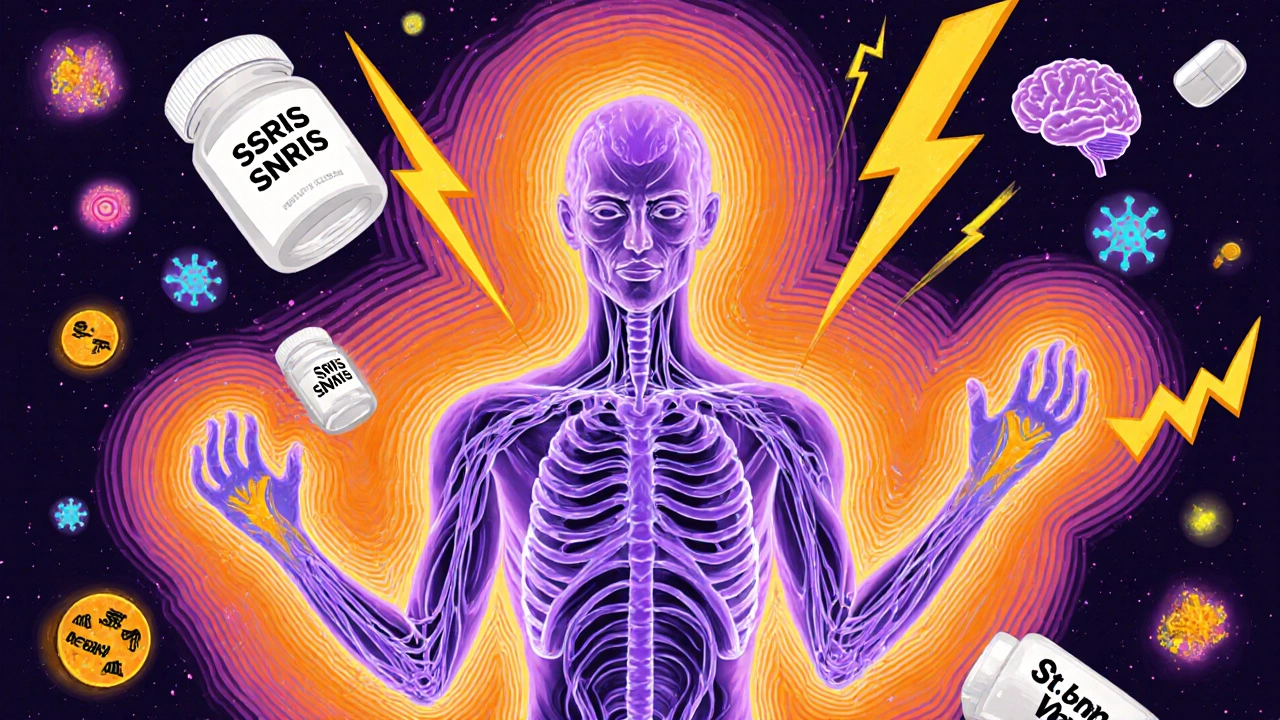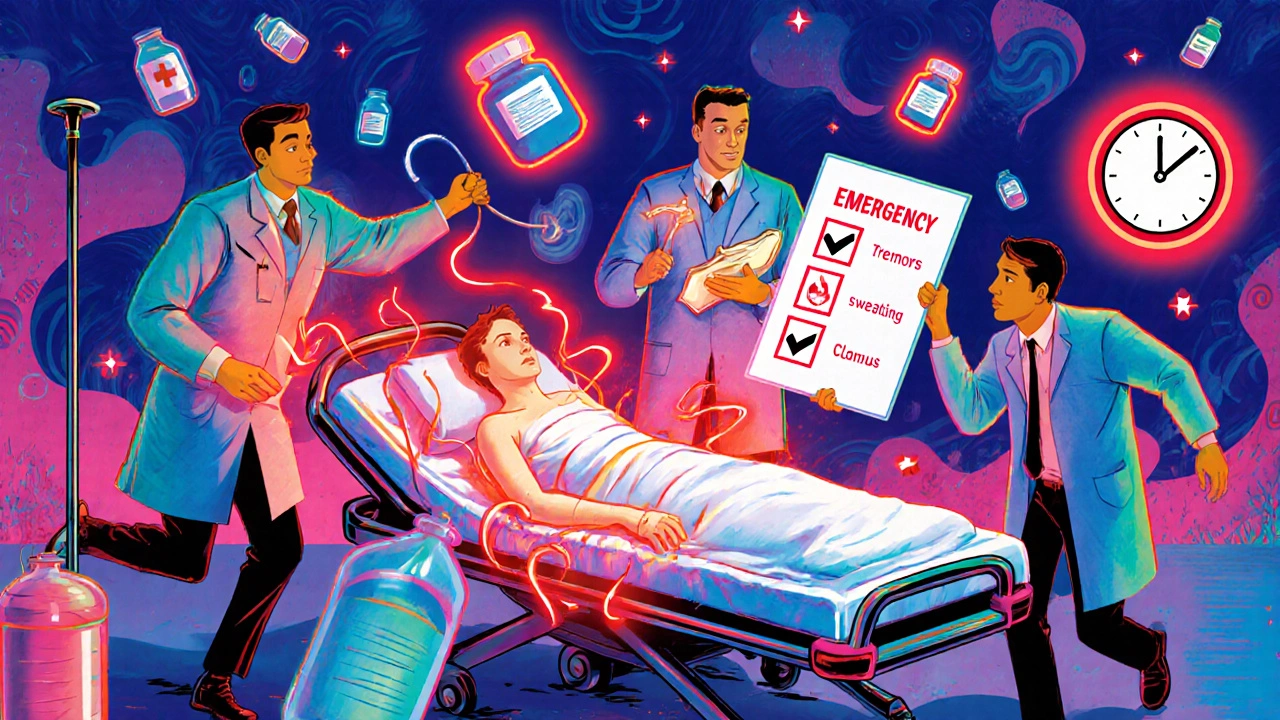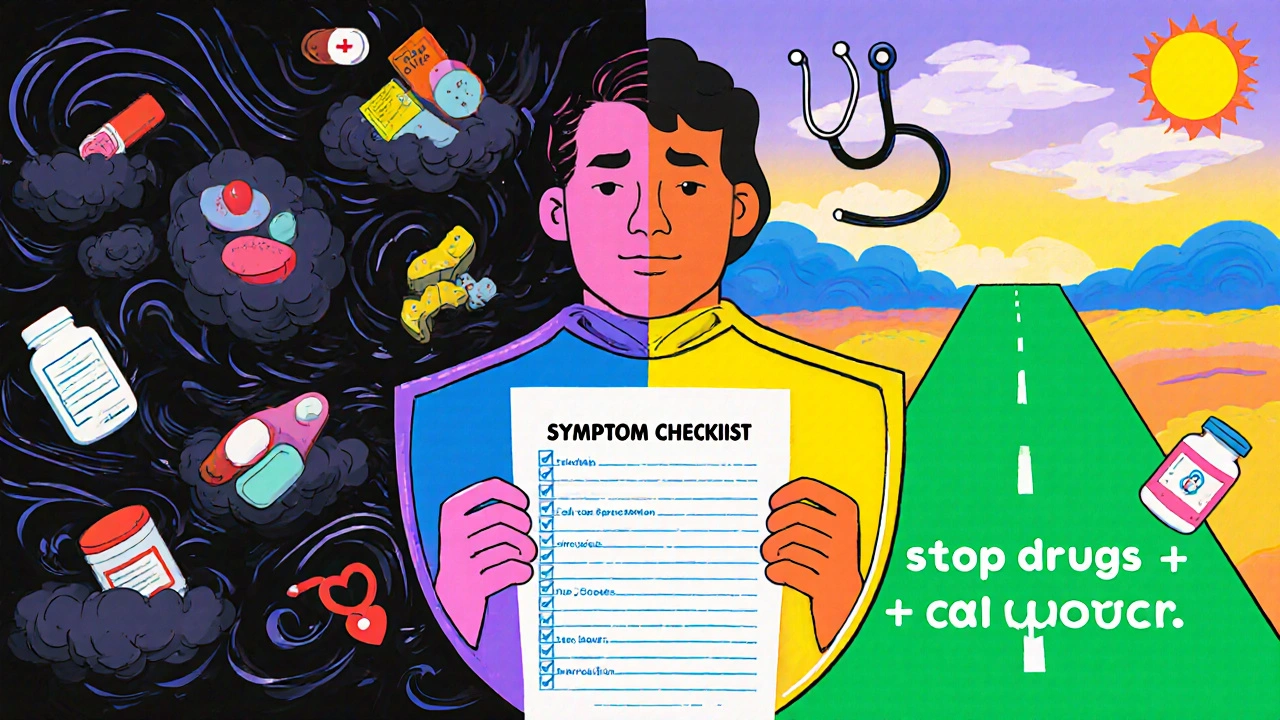Serotonin Syndrome: Causes, Symptoms, and Emergency Response for Medications

Serotonin Syndrome Risk Checker
Check Your Medication Risk
This tool identifies potential serotonin syndrome risks based on medication combinations. Never rely on this tool for medical diagnosis. Always consult your doctor or pharmacist.
When you start a new medication or add one to your existing list, you expect relief - not a medical emergency. But for some people, even a small change in their drug routine can trigger something dangerous: serotonin syndrome. It doesn’t happen often, but when it does, it can turn deadly in hours. And too often, it’s missed - dismissed as anxiety, a flu, or just a side effect.
What Exactly Is Serotonin Syndrome?
Serotonin syndrome isn’t an allergy. It’s not a mental health flare-up. It’s a toxic overload of serotonin - a chemical your brain and body use to regulate mood, sleep, digestion, and muscle control. When too much serotonin builds up, your nervous system goes into overdrive. Symptoms can start within minutes or hours after taking a new drug or increasing a dose. And they escalate fast.
This condition was first noticed in the 1960s when people on certain antidepressants took tryptophan supplements and suddenly developed fever, shaking, and confusion. Today, it’s mostly caused by combinations of common medications - especially when doctors don’t check for interactions. The good news? If caught early, it’s treatable. The bad news? If it’s missed, it can kill.
What Medications Cause It?
You don’t need to be on a dangerous cocktail to trigger serotonin syndrome. Sometimes, it’s just two common drugs you wouldn’t think to combine.
- SSRIs - like sertraline (Zoloft), fluoxetine (Prozac), escitalopram (Lexapro)
- SNRIs - like venlafaxine (Effexor), duloxetine (Cymbalta)
- MAOIs - like phenelzine (Nardil), tranylcypromine (Parnate)
- Triptans - for migraines, like sumatriptan (Imitrex)
- Opioids - tramadol (Ultram), fentanyl, meperidine (Demerol)
- Illicit drugs - MDMA (ecstasy), cocaine, LSD
- Supplements - St. John’s wort, tryptophan, 5-HTP
The most dangerous mix? An MAOI with an SSRI. That combo can be fatal. But even adding tramadol to your SSRI - something many people do for pain - can push you over the edge. About 80% of cases involve two or more serotonergic drugs. And the risk spikes within 24 hours of starting or increasing a dose.
What Are the Symptoms?
Serotonin syndrome doesn’t have one clear sign. It’s a trio of problems that show up together:
- Neuromuscular - tremors, muscle spasms, twitching, overactive reflexes, rigid muscles
- Autonomic - sweating, fever, fast heartbeat, high blood pressure, diarrhea
- Mental status - agitation, confusion, hallucinations, restlessness
Here’s what you’ll actually notice in real life:
- A sudden, unexplained shaking - not from cold, not from caffeine. Just trembling hands or legs.
- Feeling like you’re burning up, even in a cool room.
- Diarrhea that comes out of nowhere, with no other stomach issues.
- Feeling anxious or “on edge” after starting a new med - worse than the usual jitters.
- Your doctor says your reflexes are too strong when they check your knees.
The first and most common sign? Tremor. A jittery feeling you can’t ignore. That’s often the only clue before things get worse.
How Is It Diagnosed?
There’s no blood test for serotonin syndrome. Doctors don’t check serotonin levels - they don’t help. Diagnosis is all about symptoms and history.
The Hunter Serotonin Toxicity Criteria is the gold standard. You’re diagnosed if you’re taking a serotonergic drug AND have one of these:
- Spontaneous clonus (involuntary muscle contractions)
- Inducible clonus (when your ankle is moved) + agitation or sweating
- Ocular clonus (eyes darting side to side) + agitation or sweating
- Tremor + overactive reflexes
- Muscle stiffness + fever + clonus
This tool is 84% accurate - far better than older methods. But many ER doctors still miss it. Why? Because symptoms look like other things: the flu, anxiety, heatstroke, or even a rare condition called neuroleptic malignant syndrome (NMS). The key difference? NMS has stiff muscles without tremors or clonus. Serotonin syndrome has tremors, twitching, and overactive reflexes.

What Happens If It’s Not Treated?
Left untreated, serotonin syndrome can spiral. Your body temperature can climb past 41.1°C (106°F). Your muscles start breaking down. Your kidneys fail. Your blood starts clotting in places it shouldn’t. This is called disseminated intravascular coagulation - and it’s life-threatening.
Studies show that if severe serotonin syndrome isn’t recognized within six hours, the chance of death triples. About 2-12% of severe cases end in death. And roughly 30% of people who get it badly enough to go to the hospital need intensive care.
One patient on Reddit shared how her doctor told her the tremors from her new antidepressant were “normal.” Two weeks later, after adding tramadol for back pain, she ended up in the ICU with a 104°F fever. She survived - but barely.
Emergency Response: What to Do
If you suspect serotonin syndrome, stop all serotonergic drugs immediately. That’s step one - no exceptions.
Mild cases: If you have tremors, sweating, and mild agitation but no fever or confusion, you might not need the hospital. But you still need to be watched. Doctors will give you a benzodiazepine like lorazepam (Ativan) to calm your nerves and stop muscle spasms. Symptoms usually fade in 24 to 72 hours.
Moderate to severe cases: You need to go to the ER. Here’s what happens:
- IV fluids to prevent dehydration from sweating and diarrhea
- Aggressive cooling - ice packs, cooling blankets - if your temperature is above 41.1°C
- Cyproheptadine (Periactin), a serotonin blocker, given as a 12 mg dose, then 2 mg every two hours if needed (max 32 mg in 24 hours)
- Dantrolene if muscle rigidity is extreme and cooling isn’t working
- Intubation and ventilation if breathing fails
There’s no magic cure. Treatment is about stopping the cause, calming the system, and supporting your body until the excess serotonin clears.
Why Is It So Often Missed?
Doctors don’t always think of it. Patients don’t connect the dots. And drug interaction alerts in electronic health records? They’re noisy. One study found they’re wrong 43% of the time - leading to “alert fatigue,” where providers start ignoring them.
Patients, too, often brush off early signs. “I just feel jittery” becomes “I’m stressed.” “I’m sweating a lot” becomes “I’m hot.” But serotonin syndrome doesn’t wait. It progresses fast.
One study found 68% of patients who reported serotonin syndrome were misdiagnosed at first. The average time to the right diagnosis? Almost 19 hours. That’s a long time to wait when your body is overheating.

How to Prevent It
Prevention is simple - but you have to be proactive.
- Always tell your doctor every medication you take - including OTC painkillers, supplements, and herbal products. St. John’s wort and 5-HTP are common hidden triggers.
- Wait 14 days after stopping an MAOI before starting any SSRI or SNRI. For fluoxetine (Prozac), wait five weeks - it sticks around in your body much longer.
- Don’t mix tramadol, fentanyl, or other opioids with antidepressants unless your doctor specifically says it’s safe.
- Ask your pharmacist to check for interactions every time you pick up a new prescription.
- Know the warning signs - tremors, sweating, fast heartbeat, confusion. If you notice them after starting a new drug, call your doctor immediately.
Electronic systems have cut serotonin syndrome cases by 22% - but only if people pay attention to them. Patient education helps, too. A 2022 study found that people who got a simple checklist of symptoms were 78% more likely to spot early signs and get help fast.
The Bigger Picture
Antidepressant use in the U.S. has jumped from 13% to 18% of adults between 2011 and 2021. That’s a lot of people with serotonin in their systems. And with more prescriptions comes more risk. Hospitalizations for serotonin syndrome rose 34% in that same time.
New drugs are always coming out - synthetic cannabinoids, designer stimulants, even new migraine meds. Each one adds another piece to the puzzle. Clinicians are updating drug interaction lists constantly. In 2024, the American Psychiatric Association added 47 new medications to their warning list.
There’s even experimental research into drugs that block serotonin production at its source - like TPH2 inhibitors. Early animal studies show promise. But for now, the best tool we have is awareness.
Can serotonin syndrome happen from one medication?
Rarely. Most cases involve two or more serotonergic drugs. But in rare cases, a very high dose of a single drug - like an overdose of an SSRI or MDMA - can trigger it. It’s much more common when drugs are combined.
Is serotonin syndrome the same as an allergic reaction?
No. Allergies involve the immune system and usually cause rashes, swelling, or breathing trouble. Serotonin syndrome is a toxic reaction in the nervous system - no immune response involved. It’s about chemistry, not immunity.
How long does serotonin syndrome last?
Mild cases usually resolve in 24 to 72 hours after stopping the triggering drugs. Severe cases can take longer - up to a week - especially if complications like muscle breakdown or organ stress occur. Recovery depends on how quickly treatment started.
Can I get serotonin syndrome from over-the-counter meds?
Yes. Cold medicines with dextromethorphan (like Robitussin DM), certain herbal supplements like St. John’s wort, and even high-dose tryptophan can trigger it - especially when mixed with antidepressants.
Should I stop my antidepressant if I feel jittery?
Don’t stop suddenly. But if you feel new tremors, sweating, or confusion after starting or changing a medication, call your doctor right away. They can tell you if it’s serotonin syndrome or just a side effect. Never stop antidepressants on your own - withdrawal can be dangerous too.
What to Do Next
If you’re on antidepressants, migraine meds, or opioids - or you’re thinking about starting them - sit down with your doctor or pharmacist. Go over every pill, patch, capsule, and supplement you take. Ask: “Could any of these interact to cause serotonin syndrome?”
Keep a list. Print out a symptom checklist. Tell a family member what to watch for. Serotonin syndrome is rare - but it’s not rare enough to ignore. You’re not being paranoid. You’re being smart.
The next time someone says, “It’s probably just anxiety,” remember: sometimes, it’s not. Sometimes, it’s your body screaming for help. Listen to it.
Kihya Beitz
November 15, 2025 AT 00:27So let me get this straight - taking tramadol with my Zoloft is now a death sentence? Cool. I’ll just keep doing both and hope for the best. 🤷♀️ At least my back hurts less than my brain does from all these medical alerts.
Jennifer Walton
November 15, 2025 AT 17:47Chemistry is not morality. The body doesn’t care about intent. It only responds to dosage and combination. Awareness is not enough - systems must change.
Shyamal Spadoni
November 15, 2025 AT 19:30you know what they dont tell u? the pharma companies know this happens and they still push these combos because they make more money if u end up in the er. they dont want u to get better they want u to keep buying. also the FDA is in their pocket. i read on a forum that 80% of the 'research' on seratonin is funded by big pharma. and the drs? theyre trained to ignore the alerts. its all a scam. and dont even get me started on how they hide the real stats. i saw a guy on reddit who said his cousin died and the death cert said 'natural causes' lol. #conspiracy #pharmaindustrialcomplex
Hollis Hollywood
November 16, 2025 AT 05:54I just want to say how important it is that someone took the time to write this out so clearly. I’ve seen so many people dismiss tremors or sweating as ‘just stress’ - and I’ve been there. A friend of mine went undiagnosed for 36 hours because her doctor thought it was anxiety. She ended up in ICU. I’m not saying this to scare anyone - I’m saying this because if even one person reads this and recognizes the signs before it’s too late, it’s worth it. Please, if you’re on meds, talk to your pharmacist. Write it down. Tell someone. You’re not being paranoid. You’re being brave.
Aidan McCord-Amasis
November 16, 2025 AT 09:17Tramadol + SSRI = bad news bears. 🚨 Just say no.
Adam Dille
November 18, 2025 AT 06:37Love this post. So many people don’t realize how sneaky this can be. I started Lexapro and then took a cold medicine with dextromethorphan - didn’t think twice. Ended up feeling like my nerves were on fire for 48 hours. Called my doc, they were like ‘oh yeah, that’s a known combo.’ I was like… WHY DID NO ONE TELL ME?! 😅 Please, if you’re on meds, make a list. Share it. Ask the dumb questions. Better safe than sorry.
Katie Baker
November 20, 2025 AT 04:41This is such a helpful breakdown - thank you for writing it. I’ve been on an SSRI for years and just started a new pain med last week. I was already nervous, but now I know exactly what to watch for. I printed the symptom checklist and taped it to my fridge. My partner knows what to look for too. Small steps, but they matter.
John Foster
November 21, 2025 AT 18:33The tragedy isn’t the syndrome - it’s the normalization of chemical imbalance as a lifestyle. We’ve turned the human nervous system into a vending machine. Pop a pill for sadness. Pop another for pain. Pop a third for sleep. And when the machine explodes? We call it ‘side effect.’ We’ve forgotten that the body is not a machine. It’s a symphony - and we’re playing it with a chainsaw. Serotonin syndrome isn’t a medical error. It’s a cultural one.
Edward Ward
November 23, 2025 AT 16:39One thing that’s rarely mentioned: the lag time between stopping a drug and the toxin clearing. People think, ‘I stopped the SSRI, I’m fine now’ - but fluoxetine’s half-life is 4 to 6 days. That’s why mixing with MAOIs after 14 days is non-negotiable. Also - cyproheptadine isn’t available everywhere. In rural areas, ERs might not stock it. That’s a huge gap in care. We need better access, not just better awareness. And pharmacists? They’re the unsung heroes here. They’re the ones catching these interactions before the doctor even sees the chart. Let’s give them more time, not less.
Andrew Eppich
November 25, 2025 AT 04:25It is regrettable that many individuals fail to exercise due diligence regarding pharmaceutical interactions. The responsibility lies not solely with physicians but with the patient to be informed. One does not casually combine substances without understanding their pharmacological profiles. This is not medical advice - it is basic personal accountability.
Jessica Chambers
November 25, 2025 AT 14:56So… I took St. John’s Wort with my antidepressant for ‘natural mood support.’ 😅 Thanks for the heads-up, I guess? I’m alive, but now I feel like a walking pharmacology fail. 🙃
Ogonna Igbo
November 25, 2025 AT 17:17Back home in Nigeria we dont have all these fancy pills but we have traditional herbs that work better. You think your body cant handle one pill? We have grandmothers who mix 10 herbs and still walk 10km to market. You people are too soft. This serotonin thing? Its a rich country problem. Stop blaming medicine and start building stronger bodies. We dont need your drugs we need your discipline.